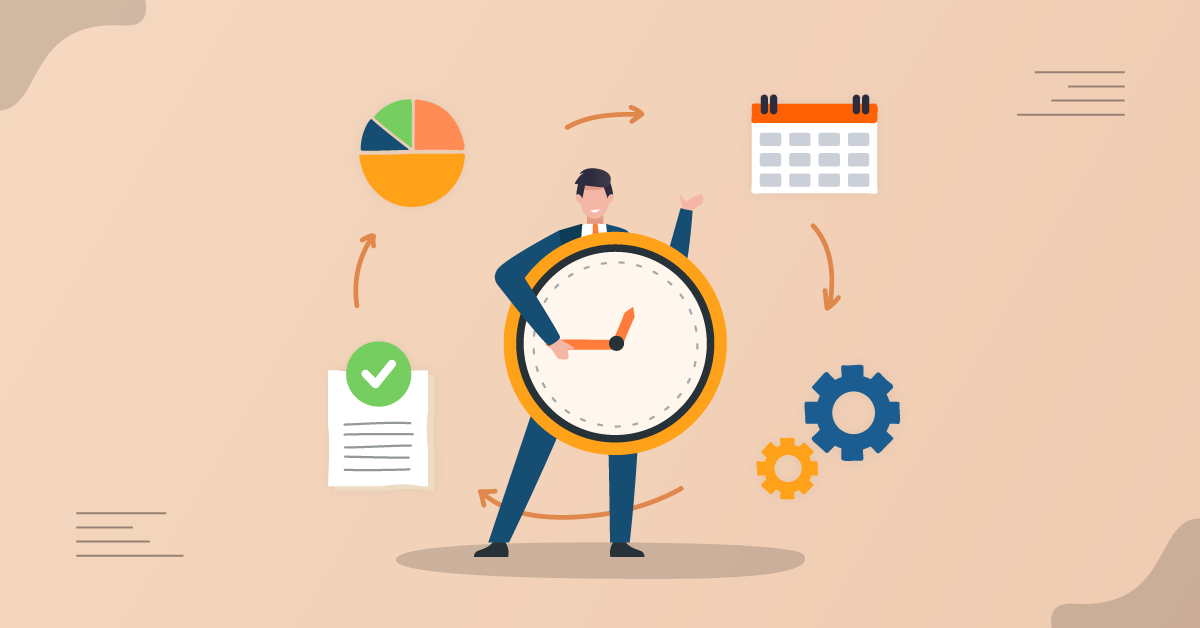
“Time management is life management.” It must be understood that with time management, life can be easy. We get the same number of hours daily, but our quality of life changes depending on how we use our time. In the business world, if you are wasting time, you are at a loss; subsequently, your business is at a loss.
Therefore, you must take the time seriously and complete your task within the given time. Many business deals are taken back due to the delay in project submission. Hence, organizations understand the value of time and the importance of a time management system.
Companies train their employees to improve their time management skills. Better time management helps in increasing productivity and increased productivity helps in measuring employee performance and the output that the employee gives. Time management skills also help in maintaining a healthy work-life balance.
These days, companies invest in different time management tools to improve their time management skills. These time management systems help you manage time with time management techniques.
According to 2023 data, 10 to 12 minutes of time management planning each day can save you two hours. To do so, one should get used to the time management system. Then, use it as required to complete your task efficiently and on time.
Table of contents
Time Management Skills and its Importance
Time management can be defined as a skill to improve workplace efficiency. It is done through planning and controlling the time utilized on the tasks. Meanwhile, time management techniques enable you to design and coordinate activities by assigning sufficient time between tasks.
Time management makes you efficient enough to do more work in less time. It also enables you to maintain a healthy work-life balance.
Below are some top 10 tips to improve your time management skills. It will help you in increasing your productivity and work efficiency.
1. Create your Schedule Daily
Starting your day with a properly organized to-do list is very important. It is necessary to learn how to manage time at work. Before you begin your work for the next day, list the most critical tasks for the next day. This process allows you to start when you arrive at the office.
Putting everything in writing will help you not to be awake at night, tossing and turning over the tasks on your mind. Instead, your subconscious works on your goals as you sleep, waking you up with fresh ideas for the day.
2. Prioritize Wisely
Prioritizing your to-do list is necessary for improving work efficiency. Begin by eliminating the tasks that you should not be doing in the first place. Then, choose the three or four most important activities and complete them first.
Doing so will ensure that you complete all of the essential tasks. Check your daily schedule and ensure that it is arranged per the importance of a task.
The Eisenhower Matrix is a time management system that allows you to prioritize work based on urgency. Accordingly, it will enable you to sort out less urgent jobs. The system prioritizes urgent tasks first. Unimportant and non-urgent tasks are given attention at the last.
How it works:
Divide your tasks into four quadrants:
Quadrant 1: Do first. Start working on these tasks on an urgent basis.
Quadrant 2: Schedule. These are the activities that can be done later. Add them to your calendar.
Quadrant 3: Delegate. Others can handle these activities.
Quadrant 4: Don’t Do. These are insignificant and non-urgent tasks and do not require immediate attention.
Interestingly, as per some studies, the success rate of the Eisenhower Matrix is almost 100% among respondents.
3. Group Similar Tasks
Save your valuable time and effort by arranging and completing similar tasks together. This will improve your operational efficiency. For example, you can set aside time for tasks like responding to texts and messages, emails, unattended phone calls, filing, etc.
Responding to emails and messages as they arrive is the epitome of distraction. Turn off your phone and email notifications to eliminate the temptation to check at unexpected times.
4. Learn to Say No
Time is nothing less than money. It is the most valuable asset, and successful time management skills involve becoming comfortable with saying ‘no’ to tasks that are not your top priority. This is even more required while working remotely.
Saying no on time allows you to focus on more critical tasks. One should learn to set personal boundaries so you don’t bite off more than you can chew. You do not overburden yourself with work.
5. Remove Distractions
Workplace distractions, including social media, web browsing, coworkers, text messages, and instant chatting, can be unlimited. Proactively reducing workplace disruptions is essential for improving your time management skills.
It helps to manage time with time-tracking tools to avoid distractions. Close all tabs except the one you are presently working on. Turn off texting notifications and delay personal phone calls till lunchtime.
Take small steps but efficient ones. Identify your top two distractions and focus on overcoming them for two weeks. Remember that getting adequate sleep, drinking enough water, and eating appropriately can all help you stay focused at work.
6. Learn your Productivity Pattern
Everyone has various tendencies for how productive they are throughout the day. Some people are more efficient in the early hours of the day, while others may not reach their optimum production until after lunch; whatever it is, track your hours!
Identifying your most productive times will help you make better use of each day. By scheduling shorter or easier work during less productive periods, you ensure that your peak production is directed toward lengthier, higher-priority projects. This can be achieved through monitoring the employees.
7. Use Technology
Technology helps in improving your time management skills to a great extent. It helps by reading the user behavior analytics of a company. Companies can use time-tracking software to improve work efficiency and employee productivity.
It is necessary for employee monitoring. Technology helps to know the work is getting done on time, and in case of any delay, time management software can be used to get things done on time.
Some studies on time-tracking tools show that an average person spends more than 6 hours daily online, making it important to influence lives, indeed.
8. Organize your Workplace
An ordered workplace can save you time during the day by eliminating the need to look for the items required to complete each task. Furthermore, acquiring organizational skills will improve your time management techniques.
Not worrying about finding specific documents or assignment supplies will reduce workplace disruption and daily stress.
9. Goals should be Smart
When you complete your assignment and discover that you have increased your productivity by improving your time management skills with some of these approaches, you should reinforce your achievement with a modest reward.
Do your behavior analysis as a user. Then, find a pleasurable reward for yourself that does not interfere with your daily productivity can motivate you and drive you to continue improving your time management skills.
10. Reinforce your Good Habits
Having realistic and progressive goals for improving your time management skills is essential. Goals should be specific so that they are clear to you and measurable so that you can check the progress. Keep track of time.
Goals should be achievable so they do not burden you with the thought of failure, realistic to achieve the target, and secured within time. You must know the outcome you want to achieve, be exact, and then dedicate the time needed to reach the result.
Conclusion
Above are the top 10 tips to improve time management skills. Follow them according to your needs, work style, and unique demands. Time-tracking software such as Leapmax helps in achieving mastery over time management.
With the help of its workforce analytics, Leapmax enables you to optimize your efforts and ensure the timely completion of everyday assignments.
Leapmax is, thus, the best employee monitoring software as it analyses various factors of user behavior to track employee productivity and effectiveness. Try it out and see how it helps in overall productivity.






